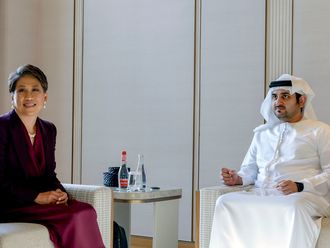Mumbai: The Reserve Bank of India increased interest rates for the fifth time this year and said its actions have brought the "monetary situation close to normal".
RBI Governor Duvvuri Subbarao boosted the repurchase rate to 6 per cent from 5.75 per cent, and the reverse repurchase rate a half point to 5 per cent, the bank said in Mumbai yesterday.
"The role of normalisation as a motivation for further actions is likely to be less important," the statement said. Stocks dropped after the reverse repo rate exceeded economists' forecasts, then climbed on signs from the statement that Subbarao has no pre-set plan to keep raising borrowing costs. At stake for the central bank is extending its success in restraining an inflation rate that's sparked demonstrations and a strike this month by millions of workers.
"It's going to be open ended for coming monetary policies whether they are going to raise because it is very much dependent on inflation," said Prasanna Ananthasubramaniam, chief economist at ICICI Securities Primary Dealership Ltd. in Mumbai. "There will be some more hikes before the end of the financial year but it's going to be much slower."
The benchmark Sensex index gained 0.4 per cent at 19,580.6 as of 1:56pm in Mumbai, after falling as much as 0.6 per cent following the release. The rupee gained 0.4 per cent to 46.205 per dollar.
Yesterday's decision contrasts with pauses in rate rises by Malaysia and South Korea this month on concern that the global recovery is faltering. It also comes after an acceleration in industrial production threatened to fuel price pressures.
"They remain hawkish on inflation and indicate that the inflation is still at unacceptably high levels," said Indranil Pan, chief economist at Mumbai-based Kotak Mahindra Bank Ltd. The central bank will likely raise rates by at least another quarter point, unless "global conditions worsen from now", he said.
Only two of 16 economists in the Bloomberg News survey had forecast a half-point move in the reverse repo rate, which is used to withdraw funds from the financial system, with 11 expecting a quarter-point increase and 3 forecasting no change. The repo rate is used to inject liquidity.
"The Reserve Bank believes that the tightening that has been carried out over this period has taken the monetary situation close to normal," it said in yesterday's statement. The central bank will monitor "macroeconomic conditions", particularly the price situation, and take further action as necessary, it said.
"Overall, our assessment is that growth remains steady," the Reserve Bank said. Inflation "may remain high for some months", it said in the statement.
Economic reports in the past week indicated both a pick-up in growth and moderation in prices. Industrial production expanded 13.8 per cent in July from a year earlier, more than twice the pace in June. India's merchandise exports increased 22.5 per cent from a year earlier to $16.6 billion in August, Commerce Secretary Rahul Khullar said on Wednesday.
"Persistent high inflation is the most important challenge for India and I don't think the RBI would derive any comfort from the fact that other countries are not raising rates," Gaurav Kapur, a Mumbai-based economist at Royal Bank of Scotland, said before the decision. "India has altogether different growth and inflation dynamics."
India's accelerating economy has lifted incomes and stoked demand for Maruti Suzuki India cars, TVS motorbikes and other goods, helping Maruti Suzuki, the nation's biggest carmaker, sell a record 104,791 vehicles last month.
Manila (DPA) The Asian Development Bank said yesterday that it approved two loans worth $470 million (Dh1.726 million) to fund infrastructure and agricultural projects in India.
The Manila-based bank said the first loan, worth $300 million, would finance a project to build and upgrade 356 kilometres of state highways in one of India's poorest states, Bihar.
The bank noted that rehabilitating the roads in the eastern state, where 43 per cent of the population lives in poverty, was a "key step in opening up new economic opportunities for farming families".
Under the project, highways would be upgraded into two-lane roads, new drainage and bridges would be constructed, and existing culverts and bridges would be strengthened.
The second loan, worth $170 million, would finance efforts to modernise the horticulture industries in Bihar and the south-western state of Maharashtra to boost farmers' incomes.












